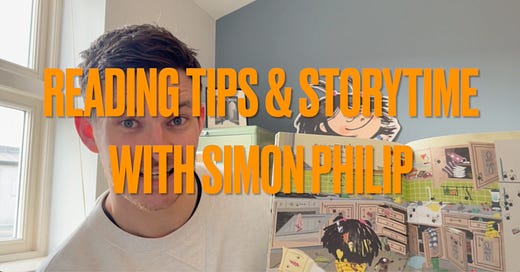FAQ Friday #7: How can I encourage my child to read – and do you have any tips for reading with them?
Why Reading for Pleasure is so important, my top tips, and a reading of I Really Want the Cake
Happy Friday, everyone.
This week’s FAQ Friday is a little different, in that it includes a video!
But not just any video.
It’s a video that features my exhausted-looking mug (I swear I wasn’t high when I filmed it) for 10 minutes, as I offer some tips on how to share a picture book with a child and read you one of mine. What could be better than that?!
(Yep – you’re right. Pretty much anything. But feel free to scroll down if you do like the sound of the video.)
The topic of today’s post is reading for pleasure (R4P) – which, as one would expect, is reading that we do of our own free will for enjoyment.
According to a recent report by the National Literacy Trust, reading enjoyment among children and young people is at its lowest level since the NLT began measuring the metric in 2005. The report states:
“Analysis of over 76,000 responses by children and young people to our Annual Literacy Survey in early 2024 shows that just 1 in 3 (34.6%) children and young people aged 8 to 18 said that they enjoyed reading in their free time. This is by far the lowest level of reading enjoyment we have recorded since we began measuring this metric in 2005. It is also the steepest year-on-year drop recorded, with an 8.8-percentage-point decline in reading enjoyment compared with 2023, and part of a broad downward trend since 2016 when almost 2 in 3 children and young people said they enjoyed reading.”
As a book-lover, author and parent, I find this hugely depressing – and hugely concerning too, especially given the importance of reading for pleasure to children’s general attainment and well-being.
Some background to Reading for Pleasure
Back in 2023, I was asked by Portsmouth School Library Service to present on Reading for Pleasure at the Portsmouth Education Partnership Conference, which, that year, focused on getting the city reading.
In preparing my presentation, I read A LOT of research on the topic, the key points of which I’ll summarise for you now.
Numerous large-scale studies provide strong evidence that R4P leads to increased attainment across the curriculum, and that pupils who enjoy reading are also BETTER readers.
Reading frequency and achievement are reciprocally related: as reading amount increases, reading achievement increases, which in turn increases reading amount.
This makes logical sense: the better we are at something, the more likely we are to enjoy doing it, and the more we enjoy something, the more motivated we are likely to be to do it.
Reading enjoyment is more important for children’s educational success than their family’s socio-economic status, family size, or their parents’ level of education.
‘Parents and the home environment are essential to the early teaching of reading and fostering a love of reading’ (Clark and Rumbold, 2006)
There is a strong relationship between whether children were read to in their early years and their reading scores at age 15 (OECD, 2012).
A caregiver reading with their child:
promotes secure attachment
reduces socio-emotional difficulties
assists with speech and language development
improves the Home Learning Environment
Clearly, then, all of us – authors, caregivers, teachers, governments… absolutely EVERYONE! – should be prioritising, encouraging and facilitating reading for pleasure in schools AND at home.
But HOW can I encourage my child to read – and do you have any tips for reading with them?
Well, I’m going to tell you – and absolutely, I do!
I answer this question in the video below, which I made earlier in the year for a school I often work with.
It includes me reading I Really Want the Cake (from 04:00 onwards, if you want to skip to that), and, at the very end, a more detailed overview of the R4P research: simply pause the video to read it.
I hope you found those tips helpful, and enjoyed I Really Want the Cake.
For more information on R4P, you can check out the following resources:
Author, speaker and The Teenage Brain Expert Nicola Morgan’s Substack (in particular, this post) and website (this, particularly)
booktrust.org.uk – the UK’s largest children’s reading charity
book recommendations & news
research into reading
lovereading4kids.co.uk – helpful for book recommendations
literacytrust.org.uk – website of the National Literacy Trust
activities for parents and families
literacy events, information and statistics
beanstalkcharity.org.uk – Coram Beanstalk works to increase R4P
reading resources, including tips for parents





These are great tips, Simon! I would also say, as the child gets older, to limit screen time. Our kids (5 and 8) only get screen time for 1-1.5 hours after dinner and they don't have their own devices. I think this is a huge contributing factor to their willingness to read at home!
This a great post on a really important topic.